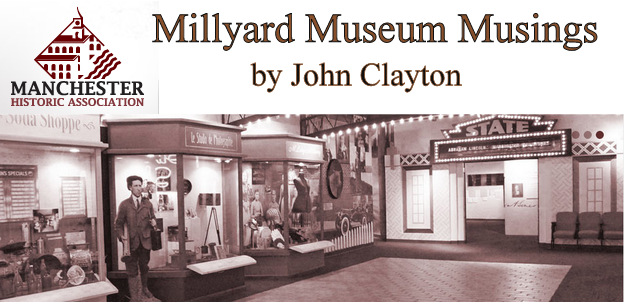 As Presidential candidates descend upon New Hampshire in ever increasing numbers, the spectacular NH Institute of Politics at St. Anselm College becomes an important cog in the wheel that is the Presidential Primary.
As Presidential candidates descend upon New Hampshire in ever increasing numbers, the spectacular NH Institute of Politics at St. Anselm College becomes an important cog in the wheel that is the Presidential Primary.
What very few of those Presidential candidates know, however, is that the NHIOP – this state-of-the-art educational enterprise – is housed within what was once a U.S. Army Reserve Center near the Manchester-Goffstown line.
Back in November of 2003, members of the St. Anselm community gathered to remember the two Manchester men for whom that center was named.
The Crafts brothers – John Mado Crafts and Donald Kimball Crafts – were both killed in combat during World War II. Their deaths came but four months apart in 1944, and the fact that they died when victory in Europe was within reach was all the more devastating for members of their close-knit family.
 And, if the notion of one family losing two sons seems too cruel a fate, it should be noted that, in Manchester alone, it was a fate shared by the Machos family, as well as the Bloods, the Crossetts, the Twardys and the Whites.
And, if the notion of one family losing two sons seems too cruel a fate, it should be noted that, in Manchester alone, it was a fate shared by the Machos family, as well as the Bloods, the Crossetts, the Twardys and the Whites.
The Crafts brothers shared everything.
Although they were born 15 months apart, they were closer than twins.
Both were graduated from Central High School.
Together, they went on to attend the University of New Hampshire where John was the top R.O.T.C. student and president of the student council, while Donald, another R.O.T.C. star, was class president.
Walking side-by-side, in uniform, they led the procession of graduates during the 1942 commencement. Before the summer was out, with both having already been commissioned as second lieutenants, the Crafts brothers entered active service and went on to train – together, naturally – at Fort Benning and later, at Camp Cook in California.
“They both were awarded promotions to first lieutenant on the same day in January, 1943,” The Manchester Union reported, “and went on to desert maneuvers in California’s Mojave Desert, came home together on Christmas Day, 1943, and went overseas in February of 1944 in the same convoy.”
There, their paths diverged slightly.
Although the brothers were both captains with the 5th Armored Division, John – who went by his middle name of Mado in honor of an uncle who died in the first World War – headed up C Company with the 47th Infantry Battalion. Meanwhile, his younger brother Donald, who family members called “Buddy,” commanded the 15th Armored Infantry’s A Company.
John fell first.
It was Aug. 10, 1944.
Just 10 days earlier, in a letter to his parents from France, he noted (and as it was later reported in The Manchester Union) that “his unit was moving so swiftly and taking so many prisoners, he was actually thinking of home.”
Just days later, when his company had outstripped its supply columns, the Germans suddenly turned on his unit. To illustrate the savagery of the fighting, four of its commanding officers were taken out in succession in a single day. John Mado Crafts died along the Seine as his unit, and the river, made its way toward Paris.
A fellow officer wrote to tell his parents about the regard with which John was held by the enlisted men and NCOs – one sergeant in particular – in his unit.
“I was greatly impressed when he said that it was the general opinion of the men in his company that ‘Captain Crafts was the finest officer in the battalion.’ Believe me, that compliment coming from an enlisted man is one few officers ever receive.”
His brother was gone, but Donald pressed on.
His unit surged through France and when the Fightin’ 5th broke into Germany from the Luxembourg border, according to The Union, “Capt. Crafts ‘ company carried out the dangerous mission of holding the high ground northeast of Niedersgarden against severe German attacks.”
In time, the 5th Armored Division became mired in the Battle of Hurtgen Forest. By some accounts, that battle – a series of prolonged encounters that accounted for 24,000 American casualties – raged from September of 1944 to February of 1945.
For Capt. Donald Kimball Crafts, it ended on Dec. 11, 1944.
Major Gen. Lunsford E. Oliver, who had presented Donald with the Silver Star just days earlier, had the sad duty of writing yet another letter that was delivered to the home of Otis and Una Crafts at 754 Chestnut St.
The toll on the family can still be felt today.
“I was there when they dedicated the center in their honor in 1957,” said Carol (Crafts) Gross, “and I know if I go again, the pain and the sadness will come back. As happy as I am for what they’re doing at the college, it was a sad, overwhelming thing.”
Carol was 20 when her brothers were killed.
Her sister, Mary (Crafts) Mendel, was just 18, but together, they do what they can to keep the memory of their brothers alive. They realize that by hosting that dedication ceremony in 2003, St. Anselm College was doing the same thing.
“When you think about all that’s going on in the world right now,” said then-college president Father Jonathan DeFelice, O.S.B., “it’s important to recognize the role the men and women of the military play in the support of freedom.
“The Institute of Politics we have created here is dedicated to things like justice and democracy and those liberties and freedoms that are the heart and soul of our society,” he added, “and without heroes like the Crafts brothers – men who made the supreme sacrifice – we might not be able to enjoy those freedoms. We do. We cherish them, and it’s important that we remember them.”
Thus, while John Mado Crafts and Donald Kimball Crafts lay buried, side-by-side, in the Brittany American Cemetery in France, they are still remembered here. They were remembered in that 2003 ceremony, and if Carol (Crafts) Gross has her way, they will be remembered into perpetuity.
“The sacrifices made by all those young men in that war?” she said. “People ought not to forget that. And the things they teach at that center? That’s what they were fighting for.”

John Clayton is Executive Director of the Manchester Historic Association. You can reach him with your historical (or existential) questions at jclayton@manchesterhistoric.org.

You’re one click away! Sign up for our free eNewsletter and never miss another thing







